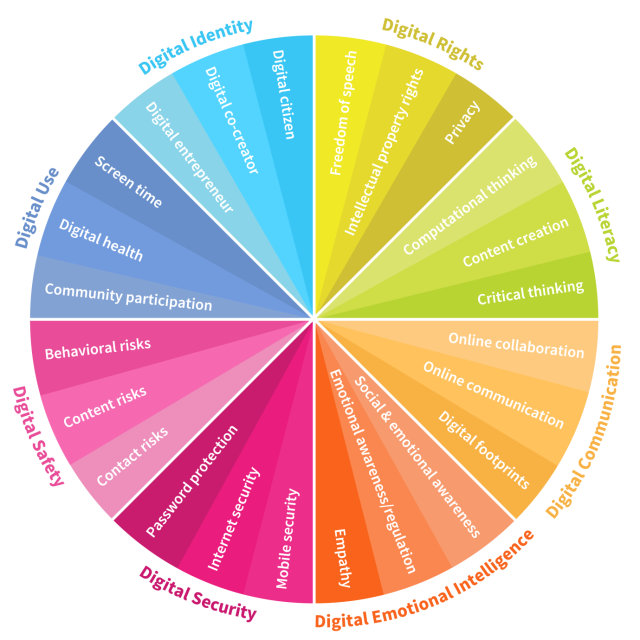
The Digital Intelligence model
Yuhyun Park, Chair of the infollutionZERO Foundation describes digital intelligence or DQ as “the set of social, emotional and cognitive abilities that enable individuals to face the challenges and adapt to the demands of digital life.”
The DQ project defines three levels of digital intelligence: citizenship, creativity and entrepreneurship. For students to become a Digital Leader they need to achieve all three.
- DQ Citizenship: take command of digital use in responsible and effective ways
- DQ Creativity: become part of the digital ecosystem by co-creating new content and turning ideas into reality, using new technologies and media
- DQ Entrepreneurship: bring about change and solve problems
Whilst this project is aimed at children, the Digital Intelligence model is still useful to consider for ourselves and also for ways we can potentially support family and friends. The eight digital intelligence sections in the model are described as:
Digital identity: The ability to create and manage one’s online identity and reputation. This includes an awareness of one’s online persona and management of the short-term and long-term impact of one’s online presence.
Digital use: The ability to use digital devices and media, including the mastery of control in order to achieve a healthy balance between life online and offline.
Digital safety: The ability to manage risks online (e.g. cyberbullying, grooming, radicalisation) as well as problematic content (e.g. violence and obscenity), and to avoid and limit these risks.
Digital security: The ability to detect cyber threats (e.g. hacking, scams, malware), to understand best practices and to use suitable security tools for data protection.
Digital emotional intelligence: The ability to be empathetic and build good relationships with others online.
Digital communication: The ability to communicate and collaborate with others using digital technologies and media.
Digital literacy: The ability to find, evaluate, utilize, share and create content as well as competency in computational thinking.
Digital rights: The ability to understand and uphold personal and legal rights, including the rights to privacy, intellectual property, freedom of speech and protection from hate speech.
References
D Q Project http://www.dqproject.org/
Park, Y. (2016) 8 Digital skills we must teach our children. World Economic Forum.


